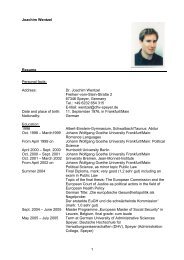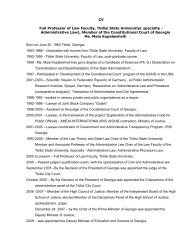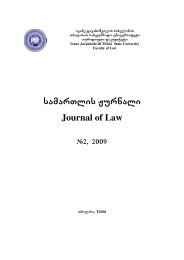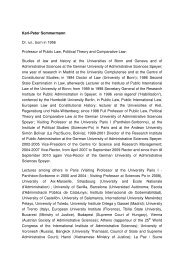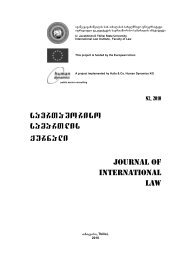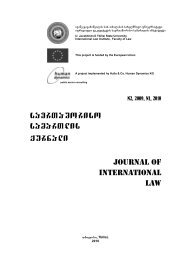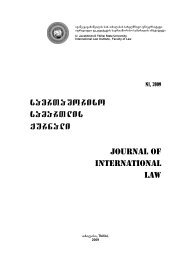Untitled
Untitled
Untitled
You also want an ePaper? Increase the reach of your titles
YUMPU automatically turns print PDFs into web optimized ePapers that Google loves.
E. SICHINAVA, “A REASONABLE TIME” REQUIREMENT<br />
hold a joint trial on all the charges brought<br />
against Mr. Piron. It was also taken into consideration<br />
that Mr. Boddaert and Mr. Piron<br />
accused each other of having committed the<br />
crime of which they were both suspected. The<br />
European Court found that in proceeding in<br />
this manner they undoubtedly took the risk of<br />
postponing even further Mr. Boddaert's committal<br />
for trial. However, the gravity of the offences<br />
in question and the interdependence<br />
of the charges, could reasonably appear to<br />
make it necessary for such a “parallel progression”<br />
of the two cases. Consequently, no violation<br />
of Article 6 (1) was found. 64<br />
At a glance, the interest of the Court, to<br />
unite the cases of the similar types, is nimble,<br />
and in itself is a positive measure, as it sets<br />
as a goal overall and objective investigation<br />
of the case, however in case if such a measure<br />
does not advance the situation of an<br />
applicant, but on the contrary, causes delays<br />
in considering his/her case, a state can not<br />
refer to this action as a justification and the<br />
measure may become a reason for imposing<br />
the liability on it.<br />
A state must always be oriented at the protection<br />
of the right of a person to swift consideration<br />
of his/her case so that he/she is not<br />
left in ambiguity for long. Therefore, when the<br />
state institutions consider their actions, the<br />
latter shall first of all take into consideration<br />
the interests of a person and grant them a<br />
priority. Otherwise the actions of the state body<br />
shall be considered contrary to the Article 6(1)<br />
of the European Convention.<br />
One of the key issues, always surfacing<br />
when assessing the actions of a state body, is<br />
overloading of courts. This is the argument,<br />
which is used by the both sides (applicant, as<br />
well as a respondent State) in order to ground<br />
their position and both sides interpret this in<br />
their own way. The European Court has on<br />
the other hand established a number of its own<br />
standards for considering this issue.<br />
In the case Zimmerman and Steiner v.<br />
Switzerland the respondent state was found<br />
liable, as almost three and a half years were<br />
required for the appeals procedures, in the<br />
course of majority of which the case was put<br />
on hold. The announced reason was that the<br />
court was overloaded, and the cases which<br />
were considered more important, were granted<br />
priority. The case of the applicant did not<br />
appear in this list. The cases were collected<br />
at the court during years and the adequate<br />
measures, which would have increased the<br />
number of staff or otherwise boost the organization<br />
of the court system, were not undertaken. 65<br />
It is clearly shown from the case that when<br />
a State, in order to ground its position, stipulates,<br />
that the court is overloaded, it has to<br />
prove the presence of the two conditions: first,<br />
that the overloading of courts is a temporary<br />
incident and not a permanent problem and the<br />
increase in number of cases was unexpected;<br />
and, second, the state undertook the adequate<br />
measures in order to improve the situation<br />
with the respective speed.<br />
Observation of these two conditions is<br />
essential, but not sufficient:<br />
It is also required that the states undertake<br />
measures with respect to the given applicant.<br />
In this respect the following cases are<br />
of interest:<br />
In the case Buchholz v. Germany the Court<br />
held that a State may not be held responsible,<br />
if the violations are caused due to the<br />
overloading of the courts, which could not<br />
have been predicted in advance and if a state<br />
undertakes swift and adequate measures<br />
thereto. The Court did not found the respondent<br />
state liable for violating Article 6(1) in this<br />
case, as the overloading of courts was a result<br />
of unexpected economic crisis in 1970s<br />
and respectively, the adequate measures were<br />
undertaken to increase a number of judges,<br />
as soon as the problem became visible. Despite<br />
the fact that these measures could not<br />
contribute to advancing the applicant’s situation,<br />
these were the measures which could<br />
have been undertaken by the respondent state<br />
in the given circumstances. 66<br />
A different decision was made in the case<br />
Ciricosta and Viola v. Italy, in which the State<br />
indicated that the state had undertaken the<br />
respective measures to improve the situation.<br />
In particular, the Italian Parliament has tried<br />
to remedy the slow workings of justice by revising<br />
the Code of Civil Procedure. The Court<br />
noted that it was not appropriate at that stage<br />
to speculate about measures which had been<br />
undertaken belatedly. 67<br />
Also, in the case Milasi v. Italy the Court<br />
found violation of Article 6. Despite the fact<br />
that the authorities had endeavored to meet<br />
the crisis of backlogging the courts by acting<br />
methodically, by giving priority to the trials of<br />
those defendants who were in custody and by<br />
123




